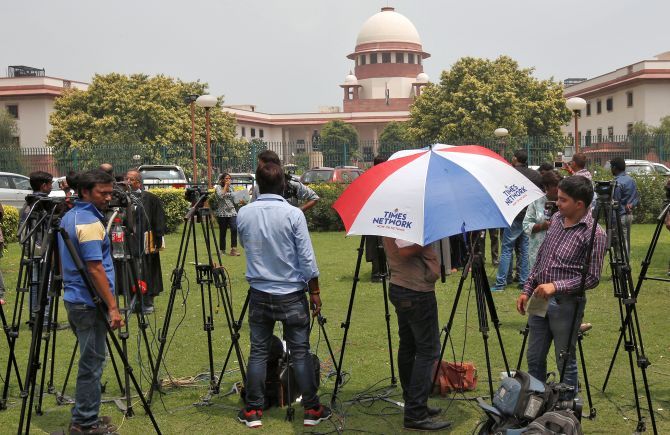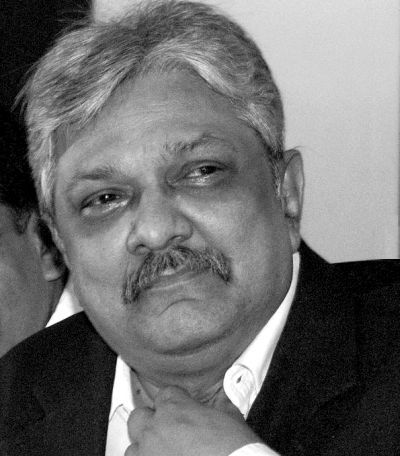'Justice K M Joseph is the senior-most chief justice of all the high courts in India.'
'The Supreme Court Collegium has recommended Justice Joseph's name to be elevated as a judge of the Supreme Court.'
'Despite these facts, the Government of India is not taking appropriate, speedy action, to forward the Supreme Court Collegium's recommendation to the President for Justice Joseph's appointment.'

IMAGE: The names of Uttarakhand high court Chief Justice Kuttiyil Mathew Joseph and advocate Indu Malhotra for their elevation as Supreme Court judges was submitted to the government almost a month ago, but their names are yet to be forwarded to the President. Photograph: Adnan Abidi/Reuters
The Supreme Court Collegium -- which consists of the Chief Justice of India and the four senior-most judges of the apex court -- on January 10 recommended the names of Uttarakhand high court Chief Justice Kuttiyil Mathew Joseph and advocate Indu Malhotra to the government for their elevation as Supreme Court judges.
As per procedure, the government should have sent these names to the President for his approval of these appointments.
After a month passed without the Union government forwarding Justice Joseph's name to the President, the Kerala High Court Advocates Association passed a resolution on February 19 and appealed to the Government of India to speed up his appointment.
Sukumaran N, an advocate at the Kerala high court and one of the first signatories of this resolution, tells Rediff.com's Prasanna D Zore why the advocates association passed such a resolution.
The Kerala High Court Advocates Association passed a resolution and sent it to the Union government expressing concern over the delay in elevating Uttarakhand Chief Justice K M Joseph as a Supreme Court judge.
What is the cause for your concern?
The Supreme Court Collegium has already recommended Justice Joseph's name to be elevated as a Supreme Court judge.
As a matter of fact, he is the senior-most chief justice of all the high courts in India.
Despite these facts, the Government of India is not taking appropriate, speedy action, to forward the Supreme Court Collegium's recommendation to the President of India for his appointment.
So, we (the Kerala High Court Advocates Association) thought it only appropriate to express our concern and request the Government of India to act fast and send the recommendation to the President.
What exactly do you mean by 'speedy action'?
Usually, the names recommended by the Supreme Court Collegium are forwarded to the President for the appointment of that person without any delay.
Not more than seven days are required to process all the paperwork after the Supreme Court Collegium sends its recommendations to the Union government, but they (the Union government) are not taking any action (on the Supreme Court Collegium's recommendation).
If the government (the law ministry) needs any clarification on any aspect of this appointment or disagree with the recommendations of the Supreme Court Collegium, they are free to seek it from the Supreme Court.
But in this case (forwarding Justice Joseph's name to the President, who then makes the appointment), a different attitude is being adopted.

Why do you think the Union government is adopting a 'different attitude' in forwarding Justice Joseph's name to the President for his approval?
We are not alleging any motives (to the government delaying his appointment). Somehow, it is being delayed.
In this case, the Supreme Court Collegium recommended his name a month ago, but the government has not yet sent it to the President for his approval.
Isn't the name of advocate Indu Malhotra -- whose name is also proposed for elevation as a Supreme Court judge by the Supreme Court Collegium -- also pending before the Union government?
Remember, she (Indu Malhotra) is an advocate. She isn't a judge.
Justice Joseph, the chief justice of the Uttarakhand high court, is the senior-most chief justice in India.
Justice Joseph is known for his integrity, honesty, knowledge in law and independent discharge of his judicial functions.
The delay in forwarding Justice Joseph's name sends wrong signals.
I am not attributing any motive to the government. Our resolution's purpose is only to bring it to the government's notice the delay that has taken place in the appointment of a judge of the Supreme Court.
We have sent our resolution to the ministry of law and justice along with a copy to the President and Chief Justice of India.
What exactly are you trying to achieve by passing a resolution of this nature and forwarding it to the law ministry, President and Chief Justice of India?
We don't know what this will achieve, but we thought it is our duty to draw the attention about this delay before these institutions.
We wanted to do something about this delay and so we passed a resolution.
Your resolution also mentions that this delay sends a 'wrong signal'. What is this 'wrong signal' you are talking about?
Again, I am not attributing any motives; they (the Union government) may have their own reasons (for not sending the Supreme Court Collegium's recommendations to the President ).
We are a responsible body. We just wanted to alert them that the Supreme Court Collegium's recommendation is with you (the government) and you have a duty to act on that.
What is the Kerala High Court Advocates Association's locus standi in this case?
When things don't happen as per the norms laid down and procedures, then it is only fair that organisations like us work towards seeing that Constitutional norms are followed.
If judges are not appointed in time, then who suffers?
The litigants in the courts and the public at large seeking justice suffer due to all the delays that happen because of delays in such appointments.
As citizens, we have to point out these gaps and remind the concerned authorities about their duties.
That's the way we have to react.










 © 2025
© 2025